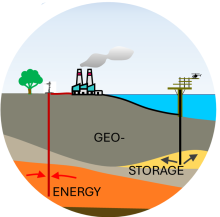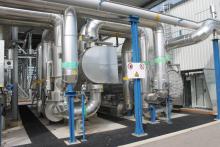The potential of the geological subsurface for Germany's energy security after the fossil age
This year's BHT theme, "The potential of the geological subsurface for Germany's energy security", focuses on the pressing energy challenges of today and the future. As the demand for sustainable and clean energy sources increases, the understanding and further development of technologies such as deep geothermal energy, carbon capture and storage (CCS) and hydrogen storage is becoming increasingly important.
Deep geothermal energy provides a reliable and continuous source of renewable energy by utilising geothermal energy for heat and power generation. This technology is particularly promising in regions such as the Bavarian Molasse Basin and the Upper Rhine Graben, which have become international centres of geothermal research and industry.
Hydrogen storage is becoming one of the key technologies for the transition to a low-carbon energy system. Hydrogen can be produced from a variety of sources and used for a wide range of applications, including as a fuel for transport, for industrial processes and as a means of storing and balancing intermittent renewable energy.
The theme of this year's colloquium addresses pressing energy challenges of today and the future. As the demand for sustainable and clean energy sources increases, the understanding and further development of technologies such as deep geothermal energy, carbon capture and storage (CCS) and hydrogen storage is becoming increasingly important.
However, it is becoming clear that oil and natural gas will not only play a role in the transition phase of the energy transition, but also as a raw material for industry.
Deep geothermal energy offers a reliable and continuous source of renewable energy by utilising geothermal energy for heat and power generation. This technology is particularly promising in regions such as the Bavarian Molasse Basin and the Upper Rhine Graben, which have become international centres of geothermal research and industry.
Hydrogen storage is becoming one of the key technologies, particularly for energy storage, without which the transition to a low-carbon energy system will not succeed. Hydrogen can be produced from a variety of sources and used for a wide range of applications, including as a fuel for transport, for industrial processes and as a means of storing and balancing intermittent renewable energy.

